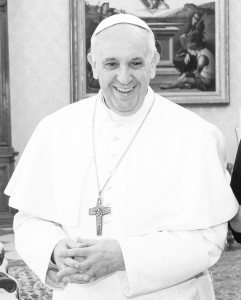 Like many students at Gustavus, I am a devout Lutheran, and it’s a running gag for Lutherans to poke fun at our Catholic friends every now and then.
Like many students at Gustavus, I am a devout Lutheran, and it’s a running gag for Lutherans to poke fun at our Catholic friends every now and then.
However, it must be understood that we should accept and tolerate others based on their beliefs, whether they be a full-blown theology nut or a staunch atheist.
In recent months, Jorge Mario Bergoglio, better known as Pope Francis, has begun to revolutionize the Catholic Church with actions and proclamations that challenge many long-held stances in their religion.
Being from Argentina, Pope Francis is the first Pope from South America. He is also the first Pope to have a Twitter account — which has over ten million followers, many of whom are self-proclaimed atheists, yet they still support him.
Whether it is his acceptance of homosexuality, or his refusal of the lavish Popemobile and official papal apartments, Pope Francis has started a revolution in the church. It may seem minor or unimportant to many in our world, but slowly, that revolution is causing quite an uproar over how we regard religion.
Named after the famous Saint Francis of Assisi, Pope Francis asked the crowd to bless him, during his acceptance speech on Mar. 13, before he would bless them. He recognizes that the church has become too obsessed with issues such as abortion, contraception, and homosexuality, rather than helping the poor and marginalized. When asked about how he regards homosexuals, he replied, “If someone is gay and he searches for the Lord and has good will, who am I to judge?”
Immediately upon his appointment as Pope, he ditched the traditional designed red shoes of his predecessor, Pope Emeritus Benedict XVI. He even refused to wear the traditional papal mozetta cape, opting for simple white robes.
He’s declared himself a friend of the Islamic community, promoted open cooperation with Protestants, and has asked fellow Christians to be more supportive and generous when it comes to helping the poor. Concerning nonbelievers, he portrayed them as “our valued allies in the commitment to defending human dignity, in building a peaceful coexistence between peoples and in safeguarding and caring for creation.”
What is perhaps the most remarkable trait about Pope Francis is his simple humility and compassion. He asked for a blessing, chooses a simple and frugal lifestyle, and he has had the audacity to tell his followers to accept others, even if their practices may differ from the Church’s beliefs.
In the last month, pictures of Pope Francis with a little boy by his side and his embrace of a severely disfigured man in a crowd have been shared everywhere on the Internet.
Twitter users have exploded in open acceptance of the Pope, with such tweets as, “I may be an atheist, but there’s something about Pope Francis that makes me want to be Catholic. He’s so inspiring,” and “So I’m a militant atheist, but I think Pope Francis is awesome! Truly someone who embodies Christ’s teachings,” and “I’m a devout Atheist, but so far I love Pope Francis.”

One woman in Argentina fervently tweeted after his appointment in March, “He speaks just like Jesus!”
From my religious viewpoint, Jesus only had one message: love thy neighbor, and do unto others as you would have them do unto you.
While Pope Francis may hold onto some long-term beliefs within the Church, such as his official stance against abortion, homosexuality, and atheism, he is a unique Pope in his outspoken acceptance rather than hatred or judgment, like his predecessors.
Having grown up in Argentina, he is familiar with the poor and needy aspects of a country. It makes sense that a Pope named after a generous saint desires for more generosity from those in the world who have been blessed with good fortune. I commend him for his compassionate nature. He has definitely inspired me, despite the fact that I am not Catholic.
Whether you go to chapel every chance you get or avoid church like the plague, keep an open mind and understand that people live their lives bound by what they accept as correct and true.
Our experiences and morals dictate our actions, so it is natural that another person’s morals will differ from yours. You don’t need to be Pope Francis or an idealistic Christian to be open and accepting, you only need to do unto others as you would have them do unto you.